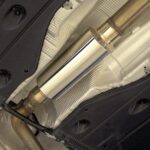Air conditioning in your car is truly a modern marvel, especially when summer heat is at its peak. It’s easy to take for granted until you’re faced with vents blowing hot air, or worse, no air at all. If your car AC suddenly stopped blowing air, you’re likely in for an uncomfortable ride and need to figure out why.
While places like Ohio might boast moderate summer temperatures, the humidity can make it feel significantly hotter and stickier. Driving without a functioning AC isn’t just uncomfortable; it can be genuinely dangerous. Cars can quickly turn into ovens, putting you at risk of dehydration and heatstroke. This risk is amplified for children, elderly passengers, and those with pre-existing health conditions. Ensuring your car’s air conditioning is working correctly is a priority, especially during the warmer months. Before you embark on any summer road trips, understanding why your AC might fail is crucial.
Decoding Why Your Car AC Isn’t Blowing Air
Like any complex system in your vehicle, your car’s air conditioning can stop working due to various reasons. Knowing the potential culprits can help you diagnose why your car AC stopped blowing air and guide you on the necessary steps for repair. Let’s explore five common reasons behind this frustrating issue.
1. Refrigerant Leaks: The Invisible Escape
One of the most frequent causes of a car AC not blowing air is a refrigerant leak. Refrigerant, often known as Freon, is the lifeblood of your AC system, responsible for cooling the air. Over time, rubber seals and hoses within the AC system can degrade, leading to leaks and allowing the refrigerant to escape.
The problem with refrigerant leaks extends beyond just a lack of cool air. These weak points can also allow moisture to enter the AC system. When moisture mixes with Freon, it creates a corrosive acid. This acidic combination can severely damage your AC system components, leading to costly repairs and potentially permanent damage. Addressing a refrigerant leak promptly is essential to prevent further complications and maintain the longevity of your car’s AC.
2. Faulty Cooling Fans: No Air Movement
Just as home air conditioning systems rely on blowers to circulate cool air, your car uses cooling fans to push the chilled air through the vents and into the cabin. If these fans malfunction, you might experience your car AC stopped blowing air altogether.
Cooling fans can fail due to several reasons, including blown fuses, electrical shorts, or physical damage from road debris. Fortunately, resolving cooling fan issues is often relatively straightforward. A qualified mechanic can typically replace faulty fans quickly, restoring airflow from your AC vents and getting you back to a comfortable drive.
3. Compressor Problems: The Heart of the AC System
The compressor is the engine of your car’s air conditioning system. It circulates refrigerant, ensuring the cooling process happens effectively. If the compressor isn’t functioning correctly, the refrigerant won’t move, and consequently, your car AC stopped blowing air.
One common cause of compressor failure is inactivity. During colder months like fall and winter, many drivers in regions with seasonal temperature variations don’t use their AC for extended periods. This lack of use can lead to compressor issues. Additionally, the compressor clutch, which engages and disengages the compressor, can become stuck. If stuck in the “on” position, the AC runs constantly; if stuck “off,” the compressor won’t engage at all, preventing cool airflow. Compressor problems usually require professional diagnosis and repair.
4. Condenser Issues: Inefficient Cooling
The condenser plays a vital role in the cooling process. It receives hot, high-pressure refrigerant gas from the compressor and cools it down, turning it into a liquid. This process is essential for effective cooling. If the condenser is failing, it won’t efficiently cool the refrigerant, leading to a noticeable decrease in your AC’s cooling capacity.
While a failing condenser might not completely stop your AC from blowing air, it can result in weak or warm air coming from the vents. If you notice your car AC not blowing cold air as effectively as it used to, a condenser problem could be the reason.
5. Electrical Issues: Hidden System Disruptors
Electrical problems can manifest in various ways within your car’s air conditioning system, often leading to a car AC stopped blowing air. These issues can range from simple problems like failed switches or blown fuses to more complex problems with the control module or wiring. A blown fuse, for instance, can easily disrupt power to the AC system, causing it to shut down. Similarly, loose connections can create electrical shorts, hindering AC operation.
While some electrical issues are relatively easy to fix, they should be addressed promptly. Electrical faults can sometimes contribute to acid buildup within the AC system, potentially causing significant damage and even requiring complete AC system replacement if left unattended. Early detection and repair are crucial to prevent escalating problems.
Stay Ahead of the Heat: Proactive AC Maintenance
Unlike some car systems, your air conditioning usually doesn’t have warning lights to signal impending problems. To avoid being caught off guard by a car AC that suddenly stopped blowing air, proactive maintenance is key. Ideally, before the hot season arrives, have your mechanic inspect your AC system. This check-up should include examining hoses and fans for wear and tear, checking for refrigerant leaks, and ensuring refrigerant levels are adequate. This AC check can often be incorporated into a routine spring tune-up.
Taking preventative steps to maintain your car’s air conditioning system, or addressing issues as soon as you notice them, can save you considerable trouble, expense, and discomfort. Staying proactive ensures you can keep your cool and enjoy comfortable drives throughout the summer months.
